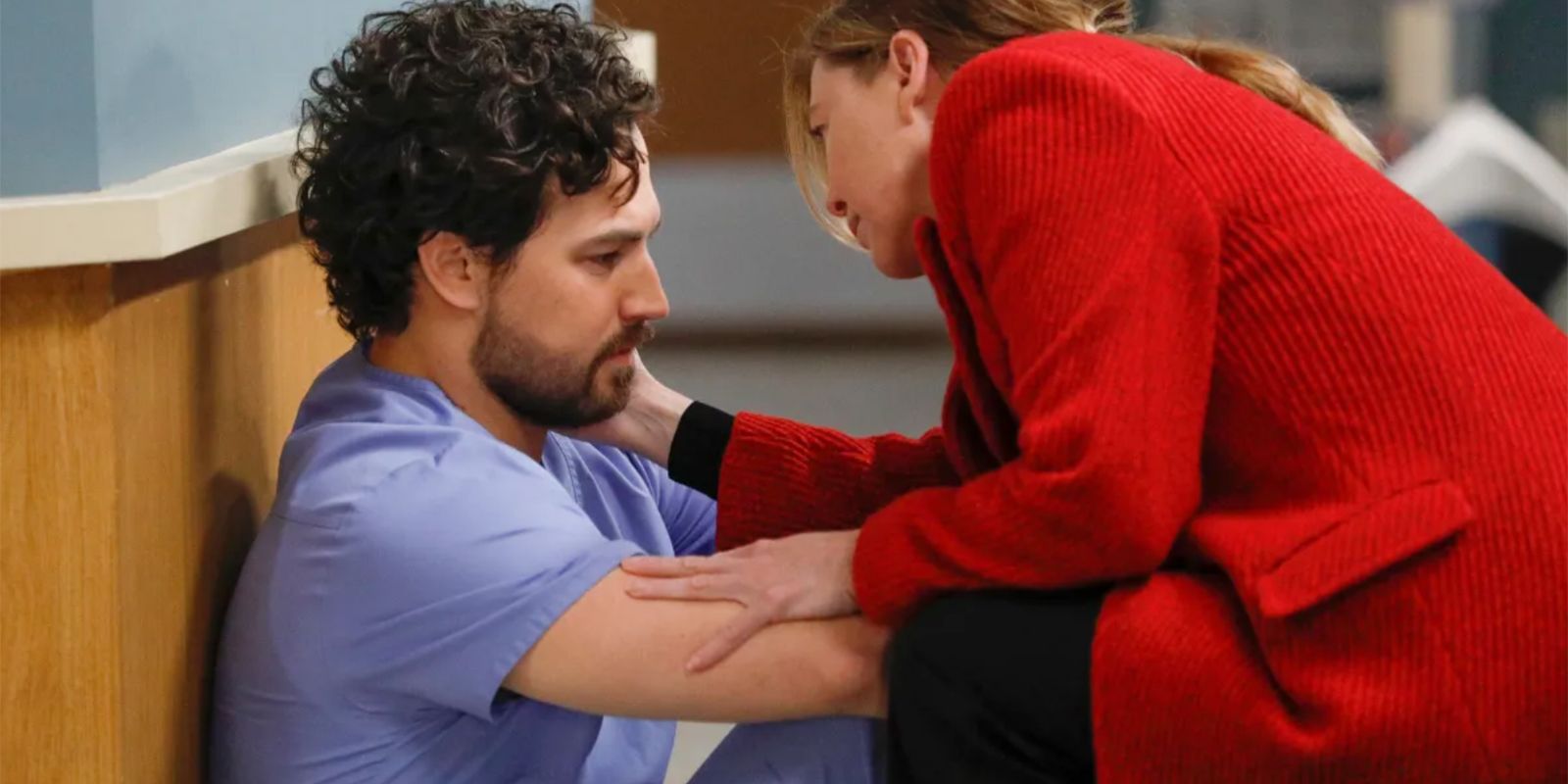
Prior to achieving primetime fame, Shonda Rhimes spent considerable effort developing the concept for the show, including its title. It’s difficult to envision the series with any other name now, but Rhimes had several potential titles in reserve before settling on the iconic one. Each title carried a unique style and could have significantly influenced the tone of the series.
In the show, some ideas were more about medicine and gravity, while others focused on character development and drama. Ultimately, the title chosen for the series, Grey’s Anatomy, reflects both its emphasis on anatomical details and emotional complexity. Shonda Rhimes’ decision to name the show Grey’s Anatomy is a smart move that references a real-life medical textbook while also acknowledging the main character, seamlessly combining surgical expertise with intricate human connections.
“Doctors” Was Safe and Literal, But Too Generic to Be Iconic
Playing It Safe Could Have Buried the Show in Medical Drama Sameness




In the early stages of its creation, I believe “Doctors” was proposed as a working title for Grey’s Anatomy, and it’s easy to understand why. The name, with its broad scope, appears suitable for a series revolving around a hospital setting, especially considering the ensemble cast. However, it lacks the spark that makes it stand out. There’s no catchy allure, no clever twist, and no immediate emotional connection in the word alone. It tells us what the show is about, but not why we should care deeply about it.
The title “Doctors” might have been fitting for a series focusing more on procedure and less on character development, like a documentary or procedural drama. However, it does not reflect the complexity, atmosphere, and multi-layered storytelling that the show is renowned for. Shonda Rhimes aimed to create narratives revolving around themes such as love, heartache, ambition, and camaraderie, but “Doctors” doesn’t suggest any of these elements. It lacks the subtle symbolism that invites viewers to interpret more deeply, a characteristic that the show possesses with its rich meaning. Moreover, the title seems less unique or distinctive compared to other titles in the series.
Instead of countless medical series that either had simple or impersonal titles, “Doctors” could easily fit among them. However, unlike “Doctors”, “Grey’s Anatomy” offers an immediate focus, a character to connect with from the beginning. While a generic title such as “Doctors” might have been beneficial for quick marketing, it would likely get lost amidst the sea of other hospital dramas in the long run, lacking the intimacy that “Grey’s Anatomy” possesses.
The unique aspect of this series is its ability to explore deeply human experiences through medical scenarios, which calls for a title that captures this essence. “Doctors” was considered too conventional. Shonda Rhimes has demonstrated her preference for bold, distinctive titles with shows like “Scandal” and “How to Get Away with Murder.” A title like “Doctors” may have overshadowed the emotional depth and cultural resonance of the show from the outset. It simply lacked the necessary spirit.
“Surgeons” Was Too Clinical to Capture the Show’s Emotional Core
It Described the Job But Missed the Heart
Initially, Shonda Rhimes pondered over a straightforward title like “Surgeons” for the series we later knew as Grey’s Anatomy. This working title provided a clear indication of the show’s content – it would focus on the lives and work of surgical specialists. The title was simple, direct, and informative, characteristics that were once synonymous with medical dramas.
Shows set in hospitals often focused more on the structure of individual cases each week rather than developing the characters. “Grey’s Anatomy” followed this pattern initially. However, Shonda Rhimes never intended for this to be the case. Instead, she aimed for a richer narrative, with characters like Meredith, Cristina Yang (played by Sandra Oh), and Derek Sheperd (Patrick Dempsey) serving as the core of the story. Using the term “Surgeons” to describe it feels impersonal and detached.
The original title didn’t allow room for the complexities of friendship, love, heartache, ambition, and personal development – topics that would later define Grey’s Anatomy. It was bland and lacked character. It didn’t suggest the vulnerability or humor that Rhimes incorporated into each episode. Moreover, it could have easily been mistaken for another typical hospital drama of the early 2000s. Without a distinct selling point or emotional appeal, “Surgeons” might have gotten lost among the other shows on TV during that time period.
The title may have drawn in viewers intrigued by the technical aspects of medicine, yet it might have repelled those seeking human connections, character developments, and emotional engagement. This wasn’t due to its focus on doctors, but rather because it delved into the complex personalities hidden beneath the white coats. A more fitting title should encapsulate this blend of intellect and empathy. In the end, Shonda Rhimes’ decision not only referenced the renowned anatomy textbook, but also anchored the narrative around Meredith Grey.
“Complications” Was Clever, But Might Have Sounded Too Dark and Ironic
A Dramatic Double Meaning That Overlooked the Warmth
a narrative where surgeons grapple not only with life-and-death situations in the operating room, but also wrestle with emotional upheavals in their romantic relationships, friendships, and personal aspirations. It offered a greater allure than earlier suggestions like “Surgeons” or “Doctors,” and subtly hinted at the multifaceted storytelling Rhimes would soon be acclaimed for.
The situation presented some difficulties, yet it had a somewhat foreboding undertone. A more fitting term might be “obstacles” as it suggests challenges without evoking the intensity typically associated with thrillers or mysteries. This iconic medical series is known for its character-driven, gradual story arcs that develop over time and allow viewers to grow alongside the cast members.
A more positive and descriptive alternative to “Complications” could be “Challenges.” Using the word “challenges” sets a tone that emphasizes growth, resilience, and learning instead of constant chaos or danger. It implies that while there are obstacles in the show, such as heartbreak and loss, Grey’s Anatomy focuses on characters overcoming their difficulties, healing, and strengthening their relationships with one another. After all, it is a series about imperfect individuals learning and evolving through their trials and tribulations.
In essence, Rhimes’ narrative style is deeply rooted in the intricate, unforeseeable chaos of both medicine and existence. However, it might have been more suitable for a grittier series adaptation, with less humor and more raw authenticity. Unfortunately, it fell short of delivering the emotional richness, complexity, and nuance that Grey’s Anatomy is known for. It came near but didn’t quite hit the mark.
“Grey’s Anatomy” was the Perfect Mix of Medical Symbolism & Character Depth
A Recognizable Title That Would Become the Most Iconic in the TV Landscape




The title, as well as an emotional homage, predominantly emphasizes the main character, Meredith Grey. It also subtly references Gray’s Anatomy, a renowned 1858 medical textbook authored by Henry Gray and illustrated by Henry Vandyke Carter. This book has been instrumental in medical education for numerous generations. By adapting and reimagining the title, Shonda Rhimes made an intelligent and significant connection.
In my humble opinion as a movie critic, Shonda Rhimes masterfully intertwined the series with genuine medical lore while skillfully preparing the ground for a profound narrative that delved beyond the study of mere anatomy, but rather encompassed life’s complexities, love, and self-discovery. By christening the show “Grey’s Anatomy”, Rhimes deftly achieved multiple objectives simultaneously. She provided a recognizable medical backdrop and established her main character as the emotional heart of the story. Rhimes structured the entire series as a metaphorical and literal exploration of human anatomy, with the heart serving as the central theme.
Each episode delves deeply into emotions, choices, and bonds, mirroring the same level of precision as medical operations. The title is refined, multifaceted, and effortlessly catchy, hinting to viewers that this isn’t your typical hospital series. It’s a tale brimming with emotion, depth, and self-reflection. The title also leaves space for development. As Meredith transitions from intern to senior doctor, from mourning child to strong parent, her personal story unfolds layer by layer, like an intricate anatomy chart.
In a manner mirroring the textbook’s approach, each system or aspect is meticulously analyzed and delved into. Shonda Rhimes didn’t merely narrate tales about individuals in scrubs; she examined what it entails to be human amidst stress, scrutiny, and emotional turmoil. Just like the characters on the show, they reflect various facets of the human condition, such as grief, aspiration, fear, love, resilience, strength, and vulnerability. The series dissects their emotional depth with great accuracy.
In the heart of this series lies Meredith, but the intricate layers of the world created by Rhimes are brought to life by the talented ensemble cast. The title “Grey’s Anatomy” symbolizes not only Meredith’s personal journey, but also the exploration of self-discovery for all characters, delving into their innermost feelings and identities. Titles such as “Surgeons” or “Complications” had their appeal, yet “Grey’s Anatomy” resonated deeply because it encapsulates the essence of the show: intelligent, emotional, and profoundly human.
Read More
- Clash Royale Best Boss Bandit Champion decks
- Vampire’s Fall 2 redeem codes and how to use them (June 2025)
- Mobile Legends January 2026 Leaks: Upcoming new skins, heroes, events and more
- World Eternal Online promo codes and how to use them (September 2025)
- Clash Royale Season 79 “Fire and Ice” January 2026 Update and Balance Changes
- M7 Pass Event Guide: All you need to know
- Best Arena 9 Decks in Clast Royale
- Clash Royale Furnace Evolution best decks guide
- Best Hero Card Decks in Clash Royale
- Clash of Clans January 2026: List of Weekly Events, Challenges, and Rewards
2025-05-01 01:22